Filter by

Also Innovators: How one computer salesman contributed to the digital revolution
‘Thank you for your order, Mr Mainframe Customer. The cost is £5 million and the lead-time for manufacture will be two years. In the meantime you will have to build a special computer centre to our specification. For our part, our project team will help you recruit and train potential programmers and we shall advise on how you might use the system.’ How different from today when the custom…
- Edition
- Ed. 1
- ISBN/ISSN
- 9781760462987
- Collation
- 292
- Series Title
- -
- Call Number
- 920 YAR a
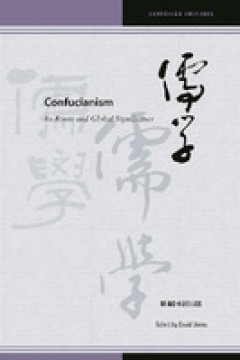
Confucianism: Its Roots and Global Significance
In Confucianism: Its Roots and Global Significance, English language readers get a rare opportunity to read the work in a single volume of one of Taiwan’s most distinguished scholars. Although Lee Ming-huei has published in English before, the corpus of his non-Chinese writings is in German. Readers of this volume will discover the hard-mindedness and precision of thinking associated with Ger…
- Edition
- Ed. 1
- ISBN/ISSN
- 9780824878320; 9780824878313
- Collation
- -
- Series Title
- Confucian Cultures
- Call Number
- 299.512 CON c
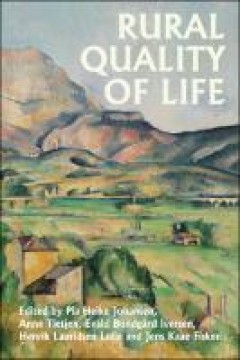
Rural quality of life
The 2020 World Happiness Report suggests that rural residents in Northern and Western Europe, North America, Australia and New Zealand are generally happier than their urban counterparts. Similar findings have been reported in country-level studies and broader regional research, especially in Europe. Such findings go against conventional wisdom in the field and represent something of a conundru…
- Edition
- Ed. 1
- ISBN/ISSN
- 9781526161642, 9781526161642
- Collation
- 505
- Series Title
- -
- Call Number
- 301.298 RUR r

Bikes and Bloomers Victorian Women Inventors and their Extraordinary Cycle Wear
The bicycle in Victorian Britain is often celebrated as a vehicle of women's liberation. But much less is known about another critical technology with which women forged new and mobile public lives – cycle wear. Despite its benefits, cycling was a material and ideological minefield for women. Conventional fashions were vastly inappropriate, with skirts catching in wheels and tangling in pedal…
- Edition
- -
- ISBN/ISSN
- 9781912685431
- Collation
- -
- Series Title
- -
- Call Number
- -

Information structure in spoken Japanese Particles, word order, and intonation
This study explores information structure (IS) within the framework of corpus linguistics and functional linguistics. As a case study, it investigates IS phenomena in spoken Japanese: particles including so-called topic particles, case particles, and zero particles; word order; and intonation. The study discusses how these phenomena are related to cognitive and communicative mechanisms of humans.
- Edition
- -
- ISBN/ISSN
- 9783961101382
- Collation
- -
- Series Title
- -
- Call Number
- -
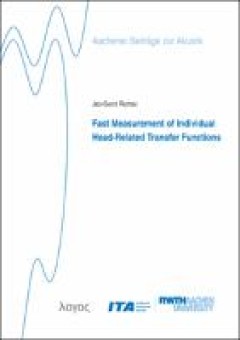
Fast Measurement of Individual Head-Related Transfer Functions
While binaural technology applications gained in popularity in recent years, the majority of applications still use non-individual Head-Related Transfer Functions (HRTFs) from artificial heads. However, certain applications, for example research of spatial hearing or hearing attention, require an physically exact and realistic binaural signal. The limiting factor that prohibits the widespread u…
- Edition
- Ed. 1
- ISBN/ISSN
- 9783832549060
- Collation
- -
- Series Title
- -
- Call Number
- 621.381 RIC f
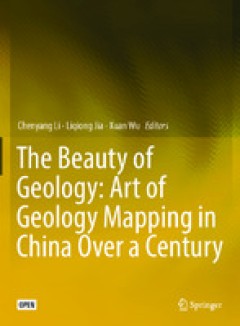
The Beauty of Geology: Art of Geology Mapping in China Over a Century
This open access book contains a collection of rare geologic maps and figures made by Chinese geologists in the last century. Preserved in National Geological Archives of China, these artworks demonstrate the development and innovation of geological mapping technology in China in the past 100 years. The collections are highly scientific and artistic, with most of the hand-drawn maps featured wi…
- Edition
- -
- ISBN/ISSN
- -
- Collation
- -
- Series Title
- -
- Call Number
- -
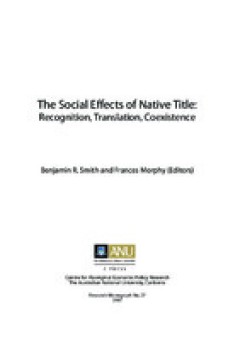
The Social Effects of Native Title: Recognition, Translation, Coexistence
The papers in this collection reflect on the various social effects of native title. In particular, the authors consider the ways in which the implementation of the Native Title Act 1993 (Cwlth), and the native title process for which this Act legislates, allow for the recognition and translation of Aboriginal law and custom, and facilitate particular kinds of coexistence between Aboriginal tit…
- Edition
- Ed. 1
- ISBN/ISSN
- -
- Collation
- 223
- Series Title
- Research Monograph, 27
- Call Number
- 305.8 SMI s

Magnesium in the Central Nervous System
Our understanding of the physiology and biochemistry of the brain has improved dramatically in the last two decades. In particular, the critical role of cations, including magnesium, has become evident, even if incompletely understood at a mechanistic level. The exact role and regulation of magnesium in particular remains elusive, largely because intracelluar levls are so difficult to routinely…
- Edition
- Ed. 1
- ISBN/ISSN
- 9780987073051
- Collation
- 356
- Series Title
- -
- Call Number
- 616.8 MAG m
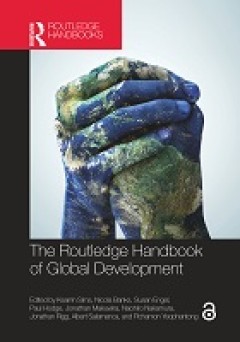
The Routledge Handbook of Global Development
This Handbook provides a comprehensive analysis of some of the world’s most pressing global development challenges – including how they may be better understood and addressed through innovative practices and approaches to learning and teaching. Featuring 61 contributions from leading and emerging academics and practitioners, this multidisciplinary volume is organized into five thematic part…
- Edition
- -
- ISBN/ISSN
- 9781003017653
- Collation
- -
- Series Title
- -
- Call Number
- -
 Computer Science, Information & General Works
Computer Science, Information & General Works  Philosophy & Psychology
Philosophy & Psychology  Religion
Religion  Social Sciences
Social Sciences  Language
Language  Pure Science
Pure Science  Applied Sciences
Applied Sciences  Art & Recreation
Art & Recreation  Literature
Literature  History & Geography
History & Geography